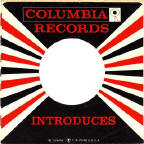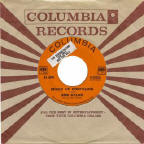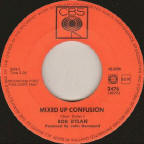A-E
All the songs listed in the Official
Rarities section are cross-referenced by song title in these
alphabetical pages.
A-E
![]() F-J
F-J
![]() K-O
K-O
![]() P-S
P-S
![]() T-Z
T-Z



This page for 1962 contains all the entries relating to the Bob Dylan's first Columbia 7" single Mixed Up Confusion/Corrina, Corrina.
If you have any entries to add to the list or additions/corrections to
existing entries, please let me know!
![]() Please note I cannot value your Dylan rarities -
see the Mission page for reasons why. Contact the
dealers on my Trading page for assistance!
Please note I cannot value your Dylan rarities -
see the Mission page for reasons why. Contact the
dealers on my Trading page for assistance!
Revised: 26 January, 2024.
"Mixed Up Confusion"/"Corrina, Corrina" - 7" mono singles, Columbia 4-42656 (USA), 14 Dec 1962:
This title was Bob's first single release under his own name. Another rarity which fetches a very high price! Roger Ford's discography in Robert Shelton's book "No Direction Home: The Life & Music of Bob Dylan" (New English Library, 1987) says that the single was originally released as Columbia 3-42656, but I have as yet seen no examples with this catalogue number. Thanks to Hans Seegers for the scans of these label variations, which would seem to prove this single was much more widely distributed than popular belief would have it. We can see that apart from the white label radio station promo, there were at least three separate pressings of the orange label single (If there's one with matrix ZSP 58625/6-1C/1C, not shown here, that would make four!) Hans Seegers informs me that of the three orange label variants shown, variant 1 (the first, with a different typeface for the title) is the rarest. The promo white label style is that of the second variant!
|
|
This single was originally released in a very distinctive Columbia generic sleeve, see below. It is the only Dylan single that appeared in this sleeve because the sleeve was discontinued at the end of 1962. Promo copies were released in the "COLUMBIA RECORDS INTRODUCES" promo sleeve (both sides the same) sent to radio stations and DJs in Nov/Dec 1962. R-0007
Mixed Up Confusion - A-side,
original mono version recorded Columbia Studios, New York, 14 Nov 1962 (take 14)
R-0008
Corrina, Corrina (traditional) - B-side, alternate mono take to The
Freewheelin' Bob Dylan version, recorded at Columbia Studios,
New York, 26 Oct 1962 (take 4 - version on The
Freewheelin' Bob Dylan is take 6), still otherwise officially unreleased |
|
|||
|
|
|
|
|
|
|
|
|
|
|
|
|
 Columbia 1962 US promo sleeve front, scan by Gerd Rundel |
 Columbia 4-42656 (USA) - orange label variant 2, A-side with "DEMO" sticker, scan by Manuel Garc�a Jara |
 Columbia 4-42656 (USA) - orange label variant 2, A-side with "DEMO" sticker in alternate Columbia sleeve, scan by Manuel Garc�a Jara |
|
|
|
|
Because R-0008 has pressing number "ZSP 58625" (promo "JZSP 58625" as shown on the photo) and "R-0007" has pressing number "ZSP 58626" (promo "JZSP 58626" as shown on the photo) it's possible Columbia originally intended R-0008 to be the A-side, but on release R-0007 was always considered the A-side as the later European 7" singles below confirm.
Matrix numbers for the copies shown are as follows:
However, both Yan Friis and Gerd Rundel have copies of this single with orange label variant 2 and matrix numbers: Side 1 - ZSP 58625-1D, Side 2 - ZSP 58626-1D so the pressing doesn't always match the label! Gerd Rundel's variant 2 copy has a white sticker on the B-side with text "FOR DEMONSTRATION USE ONLY NOT FOR SALE". The A-side of this copy is the same as that of Hans Seegers' variant 2 copy.
Manuel Garc�a Jara's variant 2 copy has a demo sticker on the A-side and comes in a third Columbia sleeve.
Mixed Up Confusion over Mixed Up Confusion!
Roger Ford says: "I think the key point in all of this is that there are two original 1962 takes which have formed the basis of all commercial releases of this song, not including the acetates:
At some point the original backing was stripped off B (take 10) and new backing dubbed on in its place, by what sounds like a completely different set of musicians. Only the tape track containing Dylan’s vocal, acoustic guitar and harmonica was retained from the 1962 recording. Additionally, the recording was slowed down by a semitone either before or after the new backing was dubbed on. This overdubbed version somehow made its way to Japan (quite possibly by mistake for the original single version) and was then issued in a mono mix on Mr D’s Collection #1, Mr D’s Collection #2 and Masterpieces, and later in a stereo mix on the original Biograph (R-0145).
Personally, I think the overdub probably originates from the 8 Dec 1964 session organised by Tom Wilson without Dylan’s involvement, which was documented in the first of Michael Krogsgaard’s series of articles for “The Telegraph”, and which produced the overdubbed version of House Of The Risin' Sun which was included in the Highway 61 Interactive CD-ROM. Although MK says that the version of Mixed Up Confusion that was overdubbed at the 1964 session was originally recorded on 14 Nov 1962, there could be some assumptions, misinterpretation, incompleteness or other inaccuracy at work there – not necessarily MK’s, but maybe whoever dug out the tapes or filled in the logs in 1964. It certainly sounds like a different set of backing musicians than the 1962 sessions, and there’s no other overdub session that we know of that this could have come from."
Prior to the 2012 release of The 50th Anniversary Collection there were four circulating takes of Mixed Up Confusion, as follows:
| Takes of Mixed Up Confusion circulating prior to the release of "The 50th Anniversary Collection" in 2012 | Early harmonica solo? | Wording of Sixth stanza |
| Take 14: Original mono single (R-0007, see above), included in mono CBS Brazil album Bob Dylan's Greatest Hits with a unique sleeve and tracklist (see 1970), recorded Columbia Recording Studios, New York, 14 Nov 1962 (take 14), alternate mix found on 1984 Columbia acetate (R-0575, see Nov 1983), stereo version on 1997 release of Biograph (R-0888, see 1997) | Harp solo immediately after Bob's
introduction "I got mixed up confusion Man, it's a-killin' me!" |
Well,
I'm lookin' for some answers |
Take 10: This recording, made at Columbia
Recording Studios, New York, on 1 Nov 1962, was found in three different
mono mixes on 1962 acetates that surfaced in 1984 (R-0576/R-0577/R-0578, see
Nov
1983. It also appeared on The 50th
Anniversary Collection (R-0576-2, see
2012). At a later
overdub session (probably on 8 Dec 1964), the original backing was stripped
off, and Dylan’s vocal, harmonica and guitar track from this original take
was overdubbed by different musicians. At some point the track was also
slowed down by a semitone (roughly 5%). This overdubbed track was later
released in two different forms:
|
No intro harp solo |
An' I
feel like a stranger (Wording of fifth stanza is also different on this take.) |
| Take 5: Second alternate take (R-0573) found on 1962 Columbia acetate that surfaced in May 1982 (see 1982), out-take from The Freewheelin' Bob Dylan, recorded at Columbia Studios, New York, 26 Oct 1962 (take 5) | No intro harp solo |
Won't
somebody tell me |
| Take 11?: Third alternate take (R-0574) found on a 1962 Columbia acetate that surfaced in Jun 1984 (see 1984), recorded Columbia Recording Studios, New York, 14 Nov 1962 (probably take 11 but not to be confused with the earlier take 11 from 1 Nov 1962, R-0962, see below). This take did not appear on The 50th Anniversary Collection (2012), presumably through oversight. | Intro harp solo similar to R-0007 |
An'
I questions a-comin' (**) |
(*) This is the published lyric, see bobdylan.com here.
(**) The wording of this line is speculative.
Many thanks to Roger Ford, Les Kokay, Bob Stacy and Ian Woodward for all their information about these alternate takes, and for permission to reproduce their findings. According to Michael Krogsgaard there were five complete takes from the session at Columbia Recording Studios, New York, on 1 Nov 1962 - takes 6, 7, 9, 10 and 11. The song was recorded again on 14 Nov 1962, with another four complete takes.
Thanks to Tom Willems for news that the 2011 European 3CD "ecolbook" release of Biograph contains the alternate take of Mixed Up Confusion from the 1985 release of the set (R-0748, see above and 1985). I have bought a copy and can confirm this. If this is a deliberate change, and not just a "Columbia Cock-up" that will be corrected as in 1997, then the stereo version of the take used for the original single (see 1997) will become a rarity, and has been allocated the number R-0888!
Seven takes of Mixed Up Confusion (five new) were released on the Sony Music Europe 4CD-R set The 50th Anniversary Collection in Dec 2012:
R-0958
Mixed Up Confusion
![]() - out-take from The
Freewheelin' Bob Dylan, recorded at Columbia Studios, New York,
26 Oct 1962 (take 3), previously uncirculating
- out-take from The
Freewheelin' Bob Dylan, recorded at Columbia Studios, New York,
26 Oct 1962 (take 3), previously uncirculating
In Michael Krogsgaard's
series of articles for “The Telegraph” on Bob's Recording Sessions
take 1 is marked as "b" (short false start) and take 2 has
no code. Take 3 is marked as "C" (complete), the first take of the song to be
marked like this.
R-0573-2
Mixed Up Confusion
![]() - out-take from The
Freewheelin' Bob Dylan, recorded at Columbia Studios, New York,
26 Oct 1962 (take 5), second alternate take to the original single (R-0007),
also without the opening harmonica solo as R-0145 but with different lyrics from
both, from a 1962 Columbia acetate that surfaced in May 1982.
- out-take from The
Freewheelin' Bob Dylan, recorded at Columbia Studios, New York,
26 Oct 1962 (take 5), second alternate take to the original single (R-0007),
also without the opening harmonica solo as R-0145 but with different lyrics from
both, from a 1962 Columbia acetate that surfaced in May 1982.
Take 4 is marked as "b" (short false start)
R-0959 Mixed Up Confusion
![]() - out-take from The
Freewheelin' Bob Dylan, recorded at Columbia Studios, New York,
1 Nov 1962 (take 6), previously uncirculating
- out-take from The
Freewheelin' Bob Dylan, recorded at Columbia Studios, New York,
1 Nov 1962 (take 6), previously uncirculating
R-0960 Mixed Up Confusion
![]() - out-take from The
Freewheelin' Bob Dylan, recorded at Columbia Studios, New York,
1 Nov 1962 (take 7), previously uncirculating
- out-take from The
Freewheelin' Bob Dylan, recorded at Columbia Studios, New York,
1 Nov 1962 (take 7), previously uncirculating
R-0961 Mixed Up Confusion
![]() - out-take from The
Freewheelin' Bob Dylan, recorded at Columbia Studios, New York,
1 Nov 1962 (take 9), previously uncirculating
- out-take from The
Freewheelin' Bob Dylan, recorded at Columbia Studios, New York,
1 Nov 1962 (take 9), previously uncirculating
Take 8 is marked as "b" (short false start)
R-0576-2 Mixed Up
Confusion
![]() - out-take from The
Freewheelin' Bob Dylan, recorded at Columbia Studios, New York,
1 Nov 1962 (take 10), the alternate
mono take without the first harmonica solo from the Japanese promo LP
Mr. D's Collection # 1 (see 1974) and
promo EP, Mr. D's Collection #2 (see
1976). This
turned up on a 1962 Columbia acetate that surfaced in Nov
1983, and an
edited version, R-0748, appeared on the 1985 original Biograph
(see 1985)
- out-take from The
Freewheelin' Bob Dylan, recorded at Columbia Studios, New York,
1 Nov 1962 (take 10), the alternate
mono take without the first harmonica solo from the Japanese promo LP
Mr. D's Collection # 1 (see 1974) and
promo EP, Mr. D's Collection #2 (see
1976). This
turned up on a 1962 Columbia acetate that surfaced in Nov
1983, and an
edited version, R-0748, appeared on the 1985 original Biograph
(see 1985)
However, Larry Crum says: "Mixed
Up Confusion CO 76982-10 on CD #2, Track 13, is a different mono mix from the
mono mix on Mr. D's Collection #1 (R-0145) and the edited stereo on the
original Biograph (R-0748). These are all the same recording but where
the Mr. D's Collection track sounds like just one channel of the stereo
version from Biograph, with no drums and very faint piano, the version on
The 50th Anniversary Collection has prominent piano and drums and is
speeded up. There is also at least one section where the piano is different:
after "Seeing my reflection" there is a discordant descending piano riff on both
the Mr. D's Collection and the original Biograph where on The 50th
Anniversary Collection the piano riff at this point is more rhythmic and
similar to the rest of the track." The R-number for this take has
therefore been revised! Roger Ford says: "I
think R-0576-2 would be a better R-number than R-0145-4, since this version,
being the original 1962 recording, relates much more closely to
R-0576/R-0577/R-0578 than
it does to R-0145, which is the later overdub with different backing."
Thanks to Blake Eikenberry for information that 2013's Side Tracks, released as a 2CD set as part of The Complete Album Collection Vol. One and also as a limited numbered edition 3LP set, also contains the alternate take of Mixed Up Confusion from the 1985 release of Biograph (R-0748)! See International Album Releases (Regular) - 2010s Multi-Packs and International Album Releases (Dylan-Only Compilations) 2010s. The stereo version of the original single from 1977's remastered Biograph has been provisionally allocated the R-number of R-0888.
R-0962 Mixed Up Confusion
![]() - out-take from The
Freewheelin' Bob Dylan, recorded at Columbia Studios, New York,
1 Nov 1962 (take 11), previously uncirculating
- out-take from The
Freewheelin' Bob Dylan, recorded at Columbia Studios, New York,
1 Nov 1962 (take 11), previously uncirculating
Thanks to Hans Seegers, Gerd Rundel and Manuel Garc�a Jara for information and scans.
"Mixed Up Confusion"/"Corrina, Corrina" - 7" mono singles, CBS 202476 (UK - cancelled), CBS 2476 (NL), 11 Nov 1966:
Label differences are as follows (information from Hans Seegers):
Manuel Garc�a Jara has a copy that doesn't match any of the four variants shown but it is very similar to variant 3.
 CBS 2476 (NL) - A-side scan by Manuel Garc�a Jara (alternate third variant) |
The text "RECORDING FIRST PUBLISHED 1966" on side A
is in a slightly different position - it is not printed over the copyright
text in the circumference and it is slightly lower (see detail scan). Shown on right is an unauthorised 7" single on yellow vinyl released by Glamourama Records in Europe in 2019, see Questionable Releases. |
|
|
|
Thanks to Hans Seegers, �amonn � Cath�in and Manuel Garc�a Jara for information and scans.
"Mixed Up Confusion"/"Corrina, Corrina" - 7" mono singles, CBS Serie Gemini 2476 (France), Jul 1968:
"Mixed Up Confusion"/"Corrina, Corrina" - 7" mono singles, CBS 2476 (Norway), 1968:
"Mixed Up Confusion"/"Corrina, Corrina" - 7" mono singles, CBS 2476 (Italy), 1969:
Thanks to Hans Seegers, Ronald Born and Tommy Lidgren for information and scans.
"Mixed Up Confusion"/"Corrina, Corrina" - 7" mono acetate, CBS (no catalogue number) (UK), Jul 1970:
Thanks to Ian Woodward for information that in Jul 1970 CBS UK made an acetate of this single which was sent with a covering letter to author Robert Shelton, author of "No Direction Home: The Life And Music Of Bob Dylan" (first published 1986, revised by Elizabeth Thomson and Patrick Humphries, 2011). Ian has photocopies of the letter and the acetate labels (now illustrated here). He believes it may have been prompted by an issue of "Rolling Stone" from late 1969 on Bob Dylan rarities mentioning this single, although it was never released commercially in the UK. Thanks to Alex Greenway, the owner of the acetate, for the photos.

A Flying Pig production
Listings � 1998-2024
The rights to material from all quoted contributors remain
with them. Copyright of all included artwork remains with the various record companies.